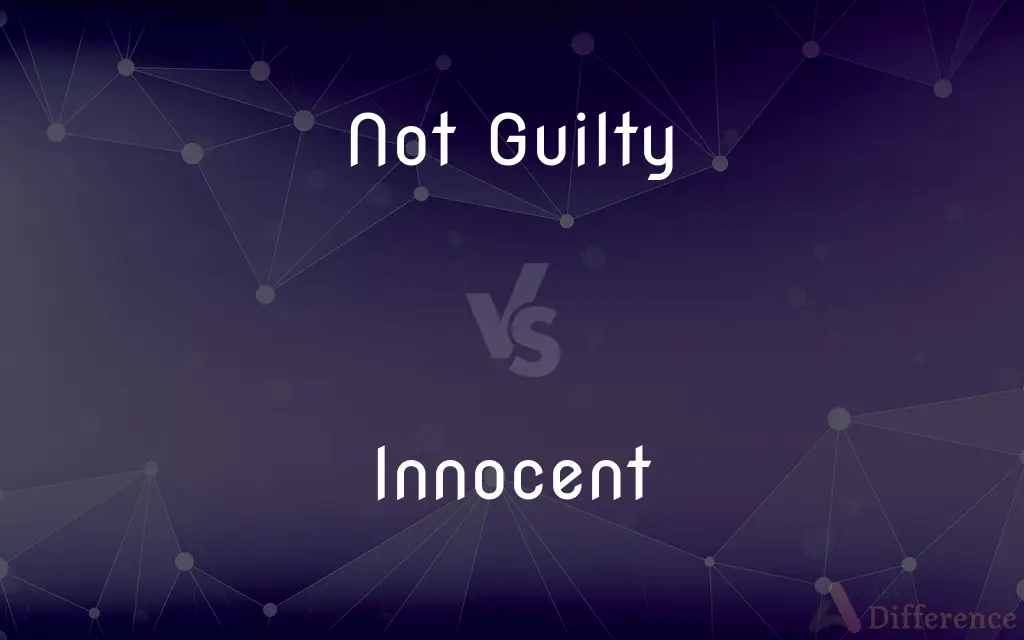Not Guilty vs. Innocent — What's the Difference?
By Tayyaba Rehman & Fiza Rafique — Published on February 9, 2024
"Not Guilty" is a legal verdict stating there's insufficient evidence to convict, while "Innocent" implies a lack of involvement or responsibility in a crime.

Difference Between Not Guilty and Innocent
Table of Contents
ADVERTISEMENT
Key Differences
"Not Guilty" is a legal judgment meaning the prosecution didn't meet the burden of proof, whereas "Innocent" signifies a state of being free from guilt, without implying a legal judgment.
In court, declaring someone "Not Guilty" does not necessarily confirm their innocence; it means the evidence was not strong enough for conviction, contrasting with "Innocent," which implies actual freedom from guilt.
"Not Guilty" focuses on the legal process and outcome, based on evidence and legal standards, while "Innocent" relates to the factual reality of a person's involvement in a crime.
The presumption in law is "innocent until proven guilty," but a "Not Guilty" verdict doesn't always equate to factual innocence, instead, it reflects a verdict based on legal thresholds.
"Innocent" is often used in everyday language to imply someone did not commit a crime, whereas "Not Guilty" is specifically a legal term used in the context of judicial proceedings.
ADVERTISEMENT
Comparison Chart
Definition
Legal verdict indicating insufficient evidence for conviction
State of not having committed a crime
Legal Implication
Focuses on the outcome of a legal process
No direct legal implication
Evidence Requirement
Insufficient evidence to prove guilt
Implies a lack of involvement, regardless of evidence
Usage Context
Specifically in judicial proceedings
In general or moral discussions
Presumption in Law
Not necessarily proving innocence
Innocent until proven guilty
Compare with Definitions
Not Guilty
Lack of Conviction
He was declared not guilty due to lack of evidence.
Innocent
Harmless or Benign
The animal looked innocent and unthreatening.
Not Guilty
Legal Verdict
The jury found him not guilty of the charges.
Innocent
Uncorrupted by evil, malice, or wrongdoing; sinless
An innocent child.
Not Guilty
Judicial Outcome
The verdict of not guilty ended the long trial.
Innocent
Not guilty of a specific crime or offense; legally blameless
Was innocent of all charges.
Not Guilty
Legal Acquittal
The court's decision was not guilty.
Innocent
Within, allowed by, or sanctioned by the law; lawful.
Not Guilty
Absence of Proof
With no conclusive proof, she was found not guilty.
Innocent
Not dangerous or harmful; innocuous
An innocent prank.
Innocent
Candid; straightforward
A child's innocent stare.
Innocent
Not experienced or worldly; naive.
Innocent
Betraying or suggesting no deception or guile; artless.
Innocent
Not exposed to or familiar with something specified; ignorant
American tourists wholly innocent of French.
Innocent
Unaware
She remained innocent of the complications she had caused.
Innocent
Lacking, deprived, or devoid of something
A novel innocent of literary merit.
Innocent
A person, especially a child, who is free of evil or sin.
Innocent
A simple, guileless, inexperienced, or unsophisticated person.
Innocent
A very young child.
Innocent
Free from guilt, sin, or immorality.
I'm sure there's an innocent explanation for all this.
The situation certainly looked bad, but it turned out that everything was innocent.
Innocent
Bearing no legal responsibility for a wrongful act.
Innocent
Without wrongful intent; accidental or in good faith.
He didn't mean anything by it; it was an innocent mistake.
The child's innocent question revealed the embarrassing truth in front of everyone.
Innocent
Naive; artless.
Innocent
Not harmful; innocuous; harmless; benign.
Innocent
(with of) Lacking (something), or knowledge of it.
Innocent
Lawful; permitted.
An innocent trade
Innocent
Not contraband; not subject to forfeiture.
Innocent goods carried to a belligerent nation
Innocent
One who is innocent, especially a young child.
The slaughter of the innocents was a significant event in the New Testament.
Innocent
(obsolete) A harmless simple-minded person; an idiot.
Innocent
Not harmful; free from that which can injure; innoxious; innocuous; harmless; as, an innocent medicine or remedy.
The spearSung innocent, and spent its force in air.
Innocent
Morally free from guilt; guiltless; not tainted with sin; pure; upright.
To offer up a weak, poor, innocent lamb.
I have sinned in that I have betrayed the innocent blood.
The aidless, innocent lady, his wished prey.
Innocent
Free from the guilt of a particular crime or offense; as, a man is innocent of the crime charged.
Innocent from the great transgression.
Innocent
Simple; artless; foolish.
Innocent
Lawful; permitted; as, an innocent trade.
Innocent
Not contraband; not subject to forfeiture; as, innocent goods carried to a belligerent nation.
Innocent
An innocent person; one free from, or unacquainted with, guilt or sin.
Innocent
An unsophisticated person; hence, a child; a simpleton; an idiot.
In Scotland a natural fool was called an innocent.
Innocent
A person who lacks knowledge of evil
Innocent
Free from evil or guilt;
An innocent child
The principle that one is innocent until proved guilty
Innocent
Lacking intent or capacity to injure;
An innocent prank
Innocent
Free from sin
Innocent
Lacking in sophistication or worldliness;
A child's innocent stare
His ingenuous explanation that he would not have burned the church if he had not thought the bishop was in it
Innocent
Used of things; lacking sense or awareness;
Ignorant hope
Fine innocent weather
Innocent
Free from Guilt
She was innocent of the accusations made against her.
Innocent
Lacking Involvement in Crime
He maintained his innocent status throughout the investigation.
Innocent
Morally Upright
Her actions were those of an innocent person.
Innocent
Naive or Unworldly
His innocent questions revealed his lack of experience.
Common Curiosities
Is 'not guilty' used outside of legal contexts?
Rarely, as it's primarily a legal term.
Does a not guilty verdict mean the person is innocent?
Not necessarily, it means there wasn't enough evidence to convict.
Is innocence a subjective concept?
It can be subjective in moral or societal contexts, but in legal terms, it's more defined.
Are children and mentally incapable individuals considered innocent?
Legally, they may be deemed incapable of being guilty due to their age or mental state.
Do all legal systems use the term 'not guilty'?
Most do, but the exact terminology and legal standards can vary by jurisdiction.
Can media portrayal affect perceptions of innocence?
Yes, media can influence public opinion about a person's guilt or innocence.
Is 'not guilty' the same as an exoneration?
No, exoneration implies proven innocence, while not guilty focuses on the lack of sufficient evidence for conviction.
Can a person be legally innocent but morally guilty?
Yes, legal innocence relates to the judicial system, while moral guilt is a personal or societal judgment.
Can someone be innocent but still found guilty?
Yes, if the evidence incorrectly points to their guilt.
Can public opinion consider a 'not guilty' person as innocent?
Public opinion may vary and doesn't always align with legal verdicts.
Does the legal system always prove innocence?
The legal system aims to determine whether there's enough evidence for guilt, not necessarily to prove innocence.
Does innocent imply a lack of all wrongdoing?
In a general sense, yes, but legally it specifically refers to the crime in question.
Can new evidence change a 'not guilty' verdict?
Generally no, due to double jeopardy laws, unless in exceptional circumstances.
Can someone declare themselves 'not guilty'?
In legal terms, a defendant can plead not guilty, but the verdict is determined by the court.
Does the burden of proof for 'not guilty' differ from proving innocence?
Yes, the burden of proof for 'not guilty' is on the prosecution to prove guilt, while proving innocence is a different, often more challenging, process.
Share Your Discovery

Previous Comparison
C++ vs. OOP
Next Comparison
Heat Cap vs. Hair SteamerAuthor Spotlight
Written by
Tayyaba RehmanTayyaba Rehman is a distinguished writer, currently serving as a primary contributor to askdifference.com. As a researcher in semantics and etymology, Tayyaba's passion for the complexity of languages and their distinctions has found a perfect home on the platform. Tayyaba delves into the intricacies of language, distinguishing between commonly confused words and phrases, thereby providing clarity for readers worldwide.
Co-written by
Fiza RafiqueFiza Rafique is a skilled content writer at AskDifference.com, where she meticulously refines and enhances written pieces. Drawing from her vast editorial expertise, Fiza ensures clarity, accuracy, and precision in every article. Passionate about language, she continually seeks to elevate the quality of content for readers worldwide.
















































